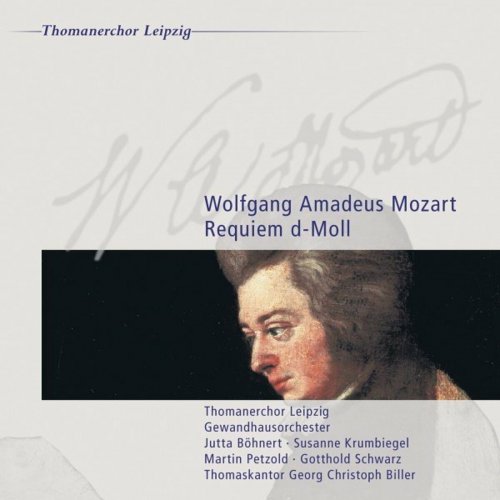
Thomanerchor Leipzig - Wolfgang Amadeus Mozart: Requiem D-Moll / Requiem D Minor KV 626 (2006)
BAND/ARTIST: Thomanerchor Leipzig
- Title: Wolfgang Amadeus Mozart: Requiem D-Moll / Requiem D Minor KV 626
- Year Of Release: 2006
- Label: Rondeau Production
- Genre: Classical, Choral
- Quality: FLAC (tracks)
- Total Time: 00:47:53
- Total Size: 202 MB
- WebSite: Album Preview
Tracklist:
Requiem D-Moll, for soloists, chorus, and orchestra, KV 626 -
01. Requiem aeternam dona eis, Domine - [04:23]
02. Kyrie eleison - [02:41]
03. Dies Irae - [01:50]
04. Tuba mirum spargens sonum - [03:23]
05. Rex tremendae majestatis - [01:56]
06. Recordare, Jesu pie - [05:13]
07. Confutatis maledictis - [02:43]
08. Lacrimosa dies illa - [03:16]
09. Domine, Jesu Christe - [03:36]
10. Hostias et preces, tibi, Domine - [03:48]
11. Sanctus, Dominus Deus Sabaoth - [01:28]
12. Benedictus qui venit in nomine Domini - [05:15]
13. Agnus Dei, qui tollis peccata mundi - [03:11]
14. Lux aeterna luceat eis, Domine - [02:39]
15. Cum sanctis tuis in aeternum - [02:31]
Requiem D-Moll, for soloists, chorus, and orchestra, KV 626 -
01. Requiem aeternam dona eis, Domine - [04:23]
02. Kyrie eleison - [02:41]
03. Dies Irae - [01:50]
04. Tuba mirum spargens sonum - [03:23]
05. Rex tremendae majestatis - [01:56]
06. Recordare, Jesu pie - [05:13]
07. Confutatis maledictis - [02:43]
08. Lacrimosa dies illa - [03:16]
09. Domine, Jesu Christe - [03:36]
10. Hostias et preces, tibi, Domine - [03:48]
11. Sanctus, Dominus Deus Sabaoth - [01:28]
12. Benedictus qui venit in nomine Domini - [05:15]
13. Agnus Dei, qui tollis peccata mundi - [03:11]
14. Lux aeterna luceat eis, Domine - [02:39]
15. Cum sanctis tuis in aeternum - [02:31]
Even though Franz Xaver Süssmayer's 1792 completion of Wolfgang Amadeus Mozart's unfinished Requiem in D minor, K. 626, is viewed by many as the standard performing version, a handful of scholars have attempted alternative versions with varying amounts of recomposition and new orchestration. The 1972 revision by Franz Beyer, which is used in this fantastic recording by Georg Christoph Biller, the St. Thomas Boys Choir Leipzig, and the Gewandhaus Orchestra, is based substantially on Süssmayer's work, but it is subtly improved through more fluid counterpoint, smoother harmonic progressions, and fuller orchestration -- in short, it sounds quite familiar to anyone who knows traditional recordings of the Requiem, only better, and offers no jarring surprises or controversial additions to make the listener question this performance's authenticity. If Süssmayer's efforts were inept, as his critics have contended, then Beyer keeps what works and gives the Requiem a more finished presentation, particularly in the conclusion of the "Lacrimosa" and in the remaining movements. This rather elegant version is complemented by the polished singing of the vocalists and chorus, and the crisply rhythmic playing of the orchestra, so if listeners are skeptical of the merits of Beyer's approach, they at least have an exceptional performance to consider. The musicians play in a period style, if not on period instruments, and the brisk tempos and clear tone colors make this recording feel in every way like an authentic re-creation. Rondeau's reproduction is transparent and bright, so listeners who prefer darker, richer colors in their Requiems should be advised accordingly.
Download Link Isra.Cloud
Thomanerchor Leipzig - Wolfgang Amadeus Mozart: Requiem D-Moll / Requiem D Minor KV 626 (2006)
My blog
Thomanerchor Leipzig - Wolfgang Amadeus Mozart: Requiem D-Moll / Requiem D Minor KV 626 (2006)
My blog
As a ISRA.CLOUD's PREMIUM member you will have the following benefits:
- Unlimited high speed downloads
- Download directly without waiting time
- Unlimited parallel downloads
- Support for download accelerators
- No advertising
- Resume broken downloads


